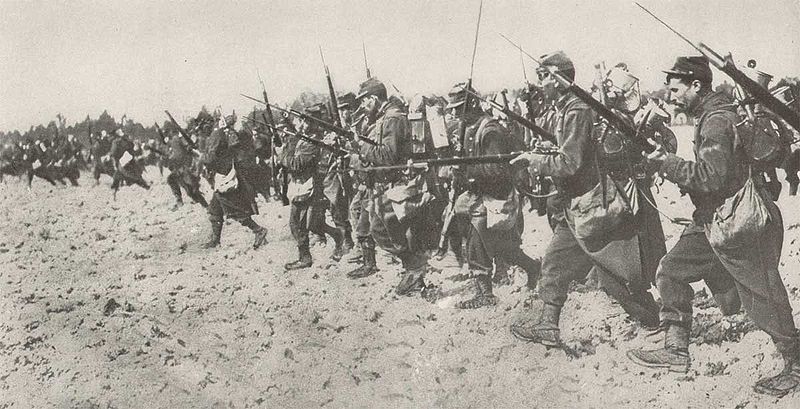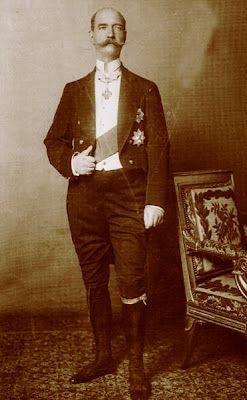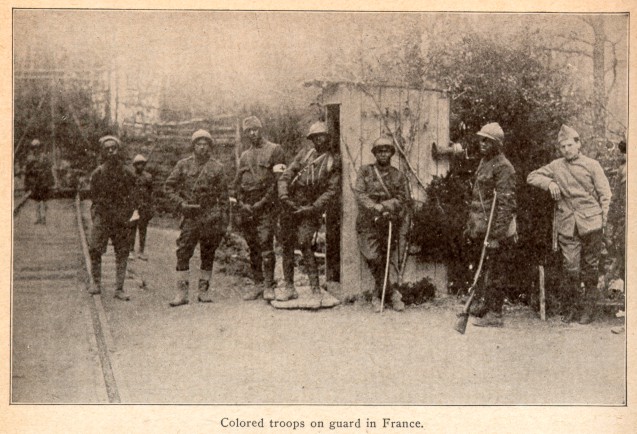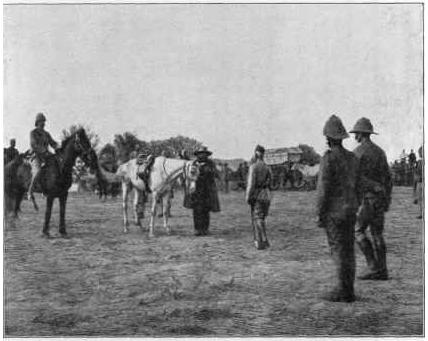The Great War: The German Front April 1908-February 1909
The German Front
April 1908-February 1909

Attacking French Infantry during the Rhineland Offensive
May, 1908
The Rhineland Offensive
1908 would see Prussia’s fortunes in the Great War plummet to new lows. After the disastrous defeat at the Second Battle of the Mosel in March, the Prussian General Staff did their utmost to hold onto the northern portion of the west bank of the Rhine. Unfortunately for the Kaiser’s troops, their efforts proved to be to little to late. On April 30, 1908 France again took to the offensive and launched a massive attacked northward from their lines west of the Rhine River. The Rhineland Offensive would prove to be a slow and arduous campaign, consisting of a series of battles as the Prussians were forced and further and further north. The Prussians were able to inflict serious casualties on the assaulting French as they fell back to prepared positions. In the end, French tactics and superior numbers of armored cars and aircraft forced the Prussians to complete their withdrawal to the eastern bank of the Rhine by August 2, 1908. Napoleon IV was reported to be overwhelmed, congratulating Marshal Foch on the victory he declared “At last, those Teutonic barbarians have been evicted from our God given soil and the natural eastern border of the Empire has been secured!”
The North Sea
After Italy’s withdrawal from the conflict, the North Sea became the dominate naval theater of the war. The Imperial French navy was the largest Entente player in the region and was primarily concerned with stopping supplies from reaching Prussian and Russian ports. Understandably the Alliance was determined to break the blockade. Another factor which complicated the North Sea Theater was that it was almost entirely surrounded by neutral nations such as Great Britain, the premier naval power of the day. By the winter of 1909, the situation in the North Sea was becoming increasingly tense due to several high profile incidents. Chief among these were the “accidental” sinkings of the British freighter Baldwin in June of 1908 when it tried to run the French blockade and of the American passenger ship Hartford, enroot to Sweden, on January, 5 1909 costing over 300 American lives.
The Invasion of Saxony
On the one year anniversary of the start of the war, a combined French, Bavarian, and Austro-Hungarian force invaded the Prussian controlled Kingdom of Saxony. By invading Saxony the Entente chose the shortest route to the Prussian capital of Berlin. Unbeknownst to the Alliance the Saxon offensive was actually intended to draw Prussian troops away from the western part of the country in preparation for the upcoming attack into Hesse-Nassau. Unfortunately for the Entente, the diversionary attack into heavily fortified Saxony cost them tens of thousands of lives and failed to capture the Saxon capital of Dresden before the offensive ground to a halt.
The Hesse-Nassau Campaign
On January 6, 1909 the French, along with sizable contingents from their south German allies, launched a massive offensive which, if successful, would put France in a position to win the war. The ultimate goal of the Hesse-Nassau Campaign was to open up an attack route to the north into the industrial Ruhr area of Prussia’s Westphalia Province. Napoleon IV and his marshals believed that if the Ruhr’s armament factories were captured along with the eastern bank of the Rhine the Prussians would be forced to sue for peace. With Prussia out of the way, the French could then mass their forces, and with the rest of Europe subdued, turn and defeat Russia.
The Entente offensive met with great success. Frankfurt fell to the French 4th Army on January 24, 1909. As the campaign continued into February the frigid winter weather only managed to slow the attacking French as the Prussians were forced further and further north. In short, the situation on Prussia’s western front was becoming increasingly desperate. So desperate in fact that Kaiser Fredrick III was reported to have remarked to an aid that if help didn’t come soon “the Kingdom’s cause and the cause of German freedom would be doomed.”
Last edited:


